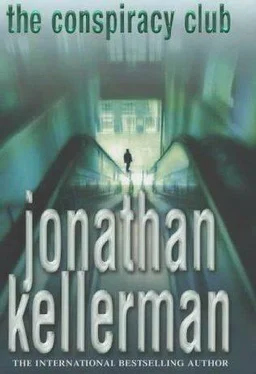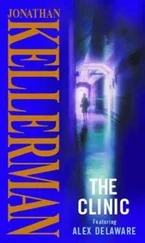“Hi,” he said. “I’m Dr. Carrier, and I’m looking for Dr. Chess.”
The door opened on a short, round sweet-looking woman in a pale yellow housedress. She had white hair and dramatic, russet brown eyebrows. Someone else of Arthur’s generation. She held a flowered teacup in one hand and smiled at him. Her eyes were a darker brown, as deep as brown can be without veering into black. Large, hoop earrings tugged at her lobes.
Like an old fortune-teller.
“Was the professor expecting you, dear?”
“Not exactly,” said Jeremy. “I work at Central Hospital, and there’s a treatment issue to discuss.”
“An emergency?”
“Not quite, ma’am. But an important issue.”
“Oh… and you came all the way out here. How dedicated- it’s such a fine hospital. All my children were born there. Professor Chess was a young man back then. Tall and handsome. He had an excellent bedside manner.” She giggled. “Of course, I was young, too. He did a masterful job.”
“Professor Chess delivered your babies?”
“Oh, yes. I know he’s a pathologist, now, but back in those days he did all kinds of medicine. What a wonderful man. I was so pleased to find out we’d be neighbors. I’m afraid he’s not in, dear.”
“Any idea where he went?”
“Oh, he travels all the time,” said the woman. “Shall I tell him you were by, Doctor…”
“Carrier. So he’s definitely traveling?”
“Oh, yes. When Professor Chess travels, I pick up his mail, see to his messages.” She smiled, shifted her teacup to her left hand, and extended her right. “Ramona Purveyance.”
Jeremy crossed the landing. Her palm was soft, slightly moist. Chubby fingers exerted no pressure.
He said, “He does like to travel.”
Ramona Purveyance nodded with enthusiasm.
Jeremy said, “I wonder how long he’ll be gone this time.”
“Hard to say. Sometimes it’s a day, sometimes it’s a week. He sends me postcards.”
“Where from?”
“Everywhere. Come, I’ll show them to you.”
Jeremy followed her into a compact apartment brightened by rear windows that afforded a view of the infinite grass. A meadow, really, with just the faintest rise as it swooped toward the horizon. A dozen or so ravens circled, blending with the sooty sky only to dart out into the fissures of light that separated the storm clouds. The effect was startling- airborne static.
Ramona Purveyance said, “They’re always out there. Beautiful things, despite their reputation.”
“What reputation is that?”
“You know, like in the Bible? Noah sent the raven out to seek peace, but the raven failed. It was the dove that brought back the olive branch. Nevertheless, I consider them beautiful creatures. Not peaceful, though. Sometimes we get cardinals, lovely red things that they are. The ravens scare them off.”
She placed her teacup on a low, glass coffee table, waddled to a maple bureau, opened a top drawer, and said, “I’m pretty sure I put them in here.”
Jeremy looked around the flat. The walls were painted green- a hospital green- and the furniture was newish and blond and inexpensive. A couple of prints- framed seascapes clipped from calendars- were the sole art pieces. No bric-a-brac, no mementos. None of the family history you’d expect for an old woman.
But that was a foolish assumption, a romanticized version of family life. Things fell apart. Or never took off.
What would he have to show when he was old?
Ramona Purveyance opened drawers, closed them, repeated the process, said, “Hmm.” The living room opened to a small, spotless kitchen. If the woman cooked, her cuisine left no scent.
“Ah, here we go,” she said. In her hand was a sheaf of postcards bound by a wide red rubber band. Without hesitation, she handed them to Jeremy.
The first dozen or so were from overseas. London, Paris, Constantinople, Stockholm, Munich. The Canal Zone- Arthur revisiting his old military haunts?- Brazil, Argentina. The next batch were all American: Oregon’s Crater Lake, New York City, St. Louis, Los Angeles, Bryce Canyon, Santa Fe, New Mexico.
Beautiful pictures of familiar landmarks on one side, the same message on the other, in a familiar hand:
Dear Mrs. P-
Traveling and learning. A.C.
Ramona Purveyance said, “He’s a dear to remember.”
“Since I’ve known him, he’s lived here,” Jeremy lied. “Must be…”
“Ten years,” she said. “Five years after I arrived. It’s a quiet place, for some city people the adjustment is hard. Not for the professor. He sold his big house and its contents and fit in quite beautifully.”
“The house in Queen’s Arms.”
“Oh, yes,” said Ramona. “He showed me pictures. A big old thing- Victorian.”
Something right! Finally!
“Must’ve been a lovely place to live in,” she went on. “Fine old furniture, those pretty leaded glass windows. But far too spacious for one person. The professor told me he’d knocked around there far too long. Well after… he should have.” She flinched. “Are you a pathologist, as well, Dr. Carrier?”
“Psychologist. After he should have, Mrs. Purveyance?”
The chocolate eyes remained steady. “After he realized how ill suited such a big place was for a person living alone.”
“Being alone can be an adjustment.”
“Have you ever lived alone, Doctor?”
“Always.”
Ramona Purveyance knitted her fingers and studied him. “A psychologist. That must be quite interesting.”
Smiling, but something in her tone told Jeremy she couldn’t have cared less. He said, “Professor Chess and I discuss interesting clinical issues from time to time. He’s deeply interested in psychosocial topics.”
“Of course he is,” she said. “The man’s as curious as a child. Sometimes I see him out there.” She motioned out the window to the endless grass. Ravens had congregated near the horizon, small and black as flyspecks. “He walks and explores, kneels and peels back the grass, looks for insects and whatnot. Sometimes he brings his metal detector and just goes clicking around. Sometimes he brings a garden spade and digs around.”
“Has he ever found anything?”
“Oh, absolutely. Arrowheads, old coins, bottles. Once he found a pearl necklace that he gave to me. Small baroque pearls, some were pitted, but overall still lovely. I gave the necklace to my granddaughter Lucy- she’s just old enough to appreciate things of beauty. The world’s a treasure trove if you know where to look.” She eyed the door. “Would you like some tea?”
“No, thanks. I’d better be going.”
“Dr. Carrier,” she said, “that term you used-’psychosocial.’ What exactly does that mean?” She canted her head to one side, a parody of coyness. “I do like to work on my vocabulary.”
“The interaction between psychology and social issues. Issues that confront society. Poverty, crime, violence. Professor Chess is especially interested in criminal violence.”
Ramona Purveyance looked down at her hands. “I see… well, I’ve got laundry to do. Shall I tell him you were by?”
“Sure, thanks,” said Jeremy. “I guess we have no idea when he’s coming back- did he pack a large suitcase?”
“I wouldn’t know, sir,” said Ramona, retrieving her teacup. The contents must’ve been cold, but she sipped slowly. Over the rim of the cup, the dark eyes studied him.
“No idea?” said Jeremy.
“He slipped a note under my door asking me to look after his mail last night. He must’ve done it late because I was up until eleven. When I woke up at six, he was gone.”
The teacup lowered. Ramona Purveyance’s expression was bland, but her eyes were guarded. Jeremy smiled. “That’s Professor Chess. Driving off on another adventure in that beautiful Lincoln.”
Читать дальше












